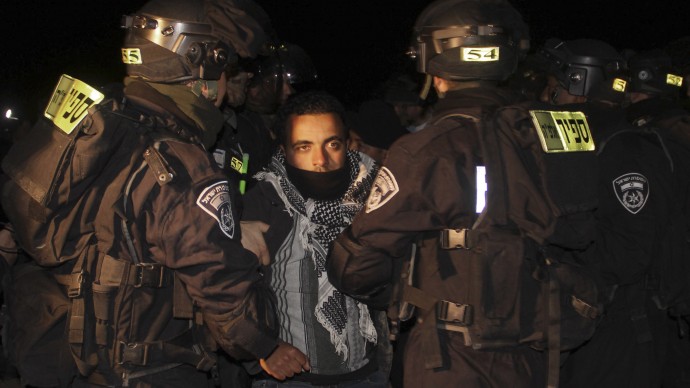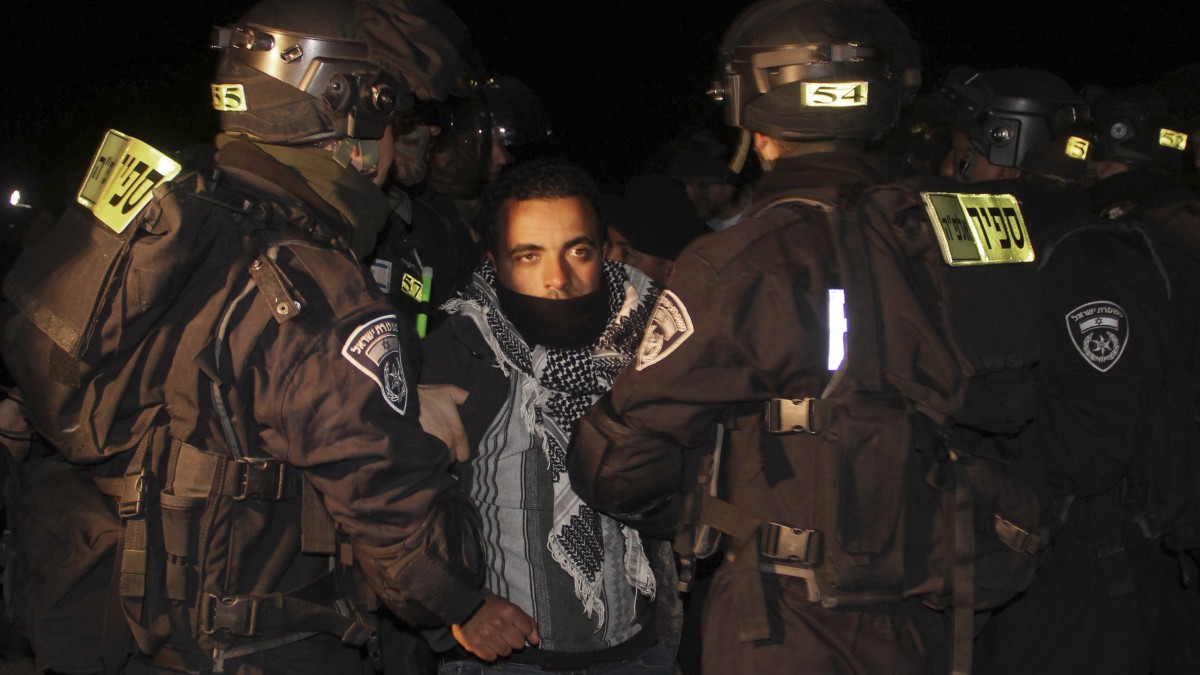
(MintPress) – More than 200 activists were forcefully evicted from a tent village erected in the West Bank Sunday. The protest action, carried out mostly by Palestinians residing in neighboring towns, was designed to block construction of illegal settlements on land near Jerusalem that will all but end the possibility of a contiguous Palestinian state on the whole of the West Bank and Gaza, with East Jerusalem as its capital.
Recent Israeli plans to build more than 4,000 settlements on E-1 land near Ma’ele Adumim, will bisect the West Bank, ending what may be the final chance at a two-state solution to decades old Israel-Palestine conflict. Unlike the illegal Jewish settlements scattered throughout the West Bank, the tent village known as Bab al-Shams, “Door of Sun,” was constructed on land owned by Palestinians. The eviction is illegal under international law and even violates Israel’s own national laws pertaining to property ownership.
The protest action
At least six activists suffered injuries and were taken to nearby hospitals for treatment during the evacuation. During the week-long occupation, activists braved unseasonably cold weather, with temperatures dipping below freezing during the nights.
More than 200 activists participated in the non-violent occupation, drawing supporters from across the West Bank and the Palestinian diaspora. Several foreign nationals were involved in the action as well.
The eviction was illegal, even under Israeli national law because the tents were erected on privately owned Palestinian land. This according to a report by +972 magazine, a publication covering news in the West Bank and Israel.
After the eviction, dozens of protesters returned to Bab al-Shams Tuesday only to face another brutal crackdown by Israeli authorities, moving in quickly to break up the non-violent protest, arrest demonstrators and prevent the repopulation of the tent city.
The action is a microcosm of broad non-violent Palestinian resistance, often lost amidst myopic media obsession with attacks by Hamas and Islamic Jihad. Palestinians, armed only with the legitimacy of international law and valid claims to statehood, are treated criminally by the Israeli Defense Force and the settlers who work to systematically displace indigenous Arab inhabitants.
The disappearing two-state solution
Because of the proliferation of illegal settlements, big and small, throughout the West Bank, many experts believe that the possibility of a contiguous Palestinian state with East Jerusalem as its capital has long since passed. More than 500,000 Jewish settlers now live amidst 2.1 million Palestinian Arabs, including occupied East Jerusalem, considered Palestinian land by the United Nations and the vast majority of countries in the international community.
After the successful U.N. bid upgrading Palestine’s political status to that of “non-member observer,” Israeli Prime Minister Benjamin Netanyahu announced the construction of more than 3,000 illegal settlement units, a clear retaliatory move against Mahmoud Abbas’ enfeebled Palestinian Authority.
These proposed settlements in the area called “E-1” are considered crucial land connecting Palestinian villages to East Jerusalem. Building there would virtually end the possibility of a two-state solution in accordance with international law.
Indeed, Israeli internal politics are such that the public is complacent, even supportive of illegal settlement expansion despite increasing condemnation and international isolation for the Jewish state.
One area where offering a glimmer of hope toward establishing a state on 22 percent of historic Palestine is the sluggish state of the Israeli economy.
Although there is strong ideological support for settlement expansion, the majority of Israelis support cutting government subsidies for the construction of new settlements in order to reduce a steep government deficit.
According to a survey released last week, 63.7 percent of Israelis, regardless of party affiliation, support steep cuts to government spending on settlements. The survey was commissioned by Boharim Taksiv Hevrati, “Voting for a Social Budget,” a social forum founded by organizations and individual activists who support changing Israel’s social and economic policies.
The military budget was the second most popular area for proposed funding cuts among the 591 respondents, a sign that perhaps the Knesset will begin to care for its citizens living in legal Israel, within the Green line, instead of diverting public funds away from necessary infrastructure and social programs.
Dismantling settlements: Is it possible?
The task of dismantling settlements may seem improbable given the mass expansion of colonies under former Israeli Prime Minister Ariel Sharon, seen by many as the architect of Israel’s settlement policy after the occupation of the West Bank following the 1967 war. These policies have increased virtually unabated under Prime Minister Netanyahu who is expected to easily win re-election in upcoming national elections at the end of this month.
However, Sharon actually led Israel’s unilateral disengagement from Gaza in 2005, an evacuation of all 21 settlements containing approximately 8,000 residents. Before the 1979 peace treaty with Israel, approximately 3,000 Jewish settlers were evacuated from the Sinai Peninsula in order to return the occupied territory to its legal owner — Egypt.
Although not a popular idea in Israel today, Tel Aviv has shown in word and in deed that land for peace works, settlements can be evacuated, relations with once hostile states can be normalized. However, the Israel Defense Force (IDF) continues to break up the wrong encampments. Those legally belonging to Palestinians are crushed while Jewish settlements expand rapidly.


